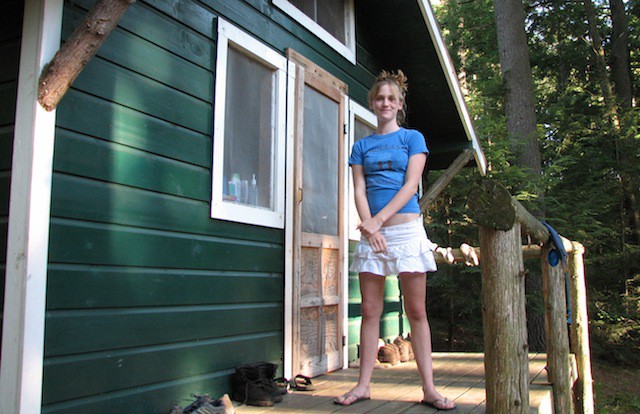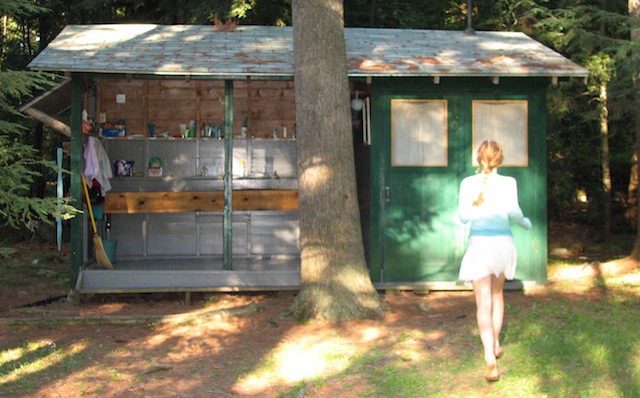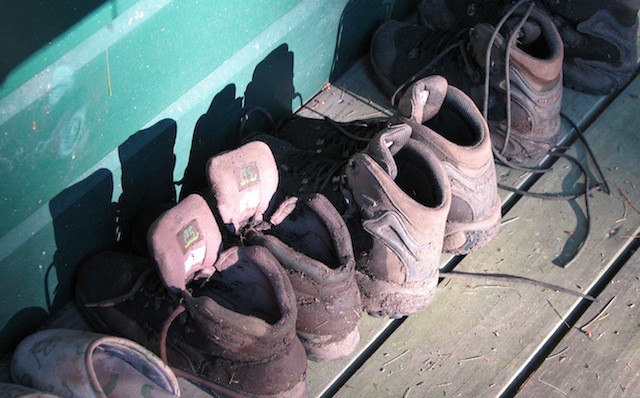The Best Time My Sister and I Got Kicked Out of Rugged Sleepaway Camp
by Callie Beusman

This is the fifth and maybe final installment in a series about summer camp.
As a youth, my mom had gone to canoeing camp in the wilds of Canada, where she lived in an actual tent and bathed in a lake and would gleefully embark on 10-day-long backpacking trips. Her first week at canoeing camp, the counselors and long-time campers all conspired to play a prank on her, which was that they told her that her mom was calling. After watching her sprint to the main lodge, everyone chortled with delight: there was no telephone at canoe camp. Ha-ha!
When my twin sister and I were 11, our parents informed us that we were to go to a camp in that same spirit — an institution where the value of ruggedness and communing with nature and the good-natured teasing of those who were too dependent on electricity were constantly affirmed. We were aghast. We wanted to stay at our heavily air-conditioned drama camp, where we partook in activities like Intro to Stage Makeup and Improv and Cartooning. Rugged sleepaway camp would be edifying and good for us, reasoned our parents. They ignored our heartfelt protests. And so, the summer after sixth grade, they shipped us off to mountain camp in the wilds of the Adirondacks for five weeks.
Mountain camp was cheerfully and almost militaristically rugged. A lot of the furniture was made out of logs. There was no electricity in any of the cabins, and the bathrooms were outhouse-like units with wooden troughs for sinks. Most of the bathroom stalls didn’t have doors. As a junior (which is the age group my sister and I started out as), you were allowed to shower twice a week.
On shower days, your entire cabin would go to the showers together, clad only in towels and flip-flops. There were three showerheads, none of which had curtains around them, and everyone was supposed to shower in pairs, all staring at each other. Choosing a “shower buddy” was very political: showering alone meant that you were unpopular. So did showering with someone weird. It was like picking teams in gym, but also coupled with the pubescent terror of being naked — in other words, sort of a complete nightmare to a young girl who had yet to develop a liberated Camp Spirit.
None of the shower buildings had roofs, and a counselor would be stationed outside. Her job was to pelt campers with pinecones if they took longer than five minutes in there.
I dwell on the showering system because it epitomizes my original misgivings about mountain camp. Firstly, mountain camp was unhygienic, and the counselors took delight in being strict. Secondly, and more distressingly, a majority of the other campers had been attending since they were eight and had already divided themselves into extremely hermetic cliques, as is the wont of the 12-year-old girl. They’d all chosen their shower buddies years ago. Being a very gangly and awkward human being at that point in my life, I spent the first couple of weeks hovering around, anxious and eager, at the fringes of my cabin-mates’ raucous interactions. After our first summer, my sister and I made up increasingly desperate and unrealistic horror stories about the terrible conditions at camp, hoping that we wouldn’t have to return. Nothing — not even our extremely clever lie that there were alligators in the lake — worked.
Halfway through my second summer, though, I managed to oust another girl as buddy #1 of C., who lived in my cabin, and form my own clique. Doing so buoyed my spirits considerably. C. was extremely pretty; she was also crass, vulgar, and hysterically funny. I’d never been friends with anyone as cool as her before. She dressed almost exclusively in Hollister booty shorts, she was far from enthused at the prospect of spending vast amounts of time outdoors, and, at the tender age of 12, she was already over a lot of the things that make summer camp enjoyable — i.e., the willful suppression of the idea “I’m too old to be making crafts out of pinecones and playing Capture the Flag.” During the daily fitness hour, she would hide under her bed and play GameBoy. Only once was I brave enough to hide with her.
In the real world, if C. and I had gone to school together, we would probably have never spoken and judged each other from a distance. In the alternate universe that was mountain camp, though, social prohibitions were looser: I’d borrow graphic novels from a girl in our cabin who had a pair of prosthetic elf ears and read them in my bunk, and C. wouldn’t make fun of either of us. A large part of me doubts that that could have happened anywhere else.
During the school year I was obsessed with academic achievement and almost compulsively well behaved. Learning from C. how to chill the fuck out was transformative for me. Camp became a haven or sorts, a place where I could act as I wanted instead of how I felt I was expected to. My camp rebellion was mild, and it was more of an internal thing, a mental disavowal of respecting authority for authority’s sake. Mostly, I just laughed whenever C. said or did something outrageous, and, for the first time in my life, I didn’t feel the need to be enthusiastic about things just because everyone else was.
Plus, I got really good at showering in public, which is the true hallmark of a relaxed and liberated young woman.

Overseeing the entire electricity-free, nude, wooded enclave was a manically merry woman with piercing blue eyes and silver hair constantly bound in a purple Scrunchie. She probably seemed like a kind, enthusiastic maternal figure to those who shared her worldview; however, since I did not really like hiking or canoeing or pooping in an outhouse without a door on it, and because I sometimes wore miniskirts and flip flops to field day, she took a disliking to me that hardened the edges of her effervescent cackle and bright, chirping proclamations.
To me, she seemed insincere, and her fervent desire to Have A Good Time and Enjoy Nature Wholesomely had an almost deranged quality to it. To her, probably, my failure to climb a lot of mountains was lazy and disrespectful. (In my defense, I was quite involved in the camp’s very desultory drama program and in archery and horseback riding, which are all genuine camp activities.)
During my final years in camp, the staff developed an air of suspicion in dealing with my sister, C., and myself. I will be the first to admit that we could act like a real pack of little shits –- however, mountain camp was almost absurdly regimented, and the worst thing we ever did was, like, make snide comments at the annual camp square dance, or maybe fight with our counselor for being too stern. Being a little shit is part of being a teenager. It’s hardly an affront to some hallowed, long-standing tradition of summer camp.
The camp staff began to call “Senior Meetings,” during which everyone in our age group would sit around a fire pit in order to address made-up concerns about the debasement of Mountain Camp Spirit. First, the camp staff took away everyone’s right to wear makeup to social, which was a weekly event during which the boys’ camp would come over and we’d all lurk awkwardly in a barn to a soundtrack of dated pop music. Then there was the whole cell phone debacle.
At mountain camp, using the institution’s landline to phone home was discouraged. Letter writing was preferred. The use of cell phones, though, was strictly and rabidly prohibited. If the be-Scrunchied camp director ever heard rumors of a mobile phone’s presence within her hallowed ground, she would go berserk. About halfway through my final year at camp, she called a Senior Meeting and demanded that everyone hand in their mobile devices. I didn’t, because I had left my phone in my mom’s car, aware that the camp director was a total psychopath on the subject.
About two weeks later, as the summer was ending, a rumor spread through the higher-ups that I had illicitly stashed a cell phone in my belongings, like a cold-blooded criminal. The camp director called a camp-wide meeting in a state of panic, saying that she knew someone had a cell phone and that that person had better come forward and clear their name or face the consequences. Unaware that I was the person she was attempting to publicly berate, I stayed silent and pondered what kind of a fool would attempt to smuggle a cell phone into such a hostile environment. Later that night one of my friends, who worked as a dishwasher in the kitchen, overheard a staff meeting in which several counselors were calling me a “little sneaky bitch,” which was, I would venture, a bit unprofessional on their part.

The following morning, I returned from breakfast and found my clothing, C’s clothing, and my sister’s clothing all over the floor. Our beds, which we were supposed to make every morning, were in a state of disarray. And all at once the camp director appeared in our doorway, icy blue eyes bugging out of her head and Scrunchie bobbing. Camp staff had searched through our belongings. No one had found a cell phone, but she was still irate. In the bottom of one of C’s backpacks, they’d uncovered cigarettes, a lighter, and diet pills. In my sister’s toiletries, they’d had found a bottle of Motrin. In mine, they had found nothing.
The camp director wanted to kick us all out of her camp, she told us, but perhaps we could all reach an agreement. The lighter, she explained, could have burned down every single building. The Motrin could have also somehow killed someone, she added, if we put it in someone’s water. She’d already called a special Senior Meeting for the express purpose of discussing what had happened. I think she was mostly angry about the lighter and diet pills and phantom cell phone but just wanted to find a way to implicate as many people as possible.
At the Senior Meeting, C. was sullen and didn’t say much. Not sensing any resistance, the camp director largely ignored her. My sister and I, on the other hand, were being very argumentative. I was furious because I was getting kicked out of camp for no reason. My sister was furious because she was getting kicked out of camp for having a bottle of Motrin, which she kept with her as a palliative for her searing 3 a.m. migraines.
That Senior Meeting culminated with the camp director, who was probably in her late 50s, sobbing and screaming at a group of 15-year-old girls. Had my sister contracted viral meningitis and self-medicated with the Motrin not realizing it was viral meningitis, she could have died, yelled the camp director through tears. Then the camp would have been sued and she would have lost her life savings and her life’s work and then — then, as is only logical, she would have had to commit suicide. It would have been all our fault, she sniffed.
At one point in the chaos, in a stroke of histrionic teenage genius, my sister screamed, “NO… BEUSMAN… WILL SET FOOT ON THIS GROUND… EVER AGAIN!” There was a lot of crying. We were all huddled in a clearing overlooking a picturesque lake glinting pleasantly in the sunlight. The whole affair was hideously, and needlessly, dramatic.
The following morning, five days before our last year at camp would have ended, our parents collected us. In the end, we hadn’t been kicked out — but we’d decided to go anyways. C. chose to stay through the end of the summer; we eventually fell out of touch.
Callie Beusman is the editorial fellow at Jezebel; her writing has also appeared in V, Interview, and IMPOSE. Two years ago, a psychic told her that she was past her prime.